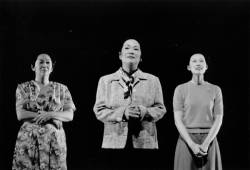THREE SISTERS, JAPANESE-AMERICAN STYLE
LOS ANGELES-- Philip Kan Gotanda's SISTERS MATSUMOTO is a mixture of memory play, family drama and social protest. Directed by Chay Yew for
East West Players, SISTERS MATSUMOTO is set in Stockton, CA. right after WW II. Returning to the family farm after four years of internment in
an Arkansas concentration camp, the Matsumoto clan attempts to rebuild
its old life. Once prosperous and important, the family has been ground
down by history and racism's grindstones. The patriarch died in the camp and is now nothing but a ghostly presence (Ken Takemoto) watching over his offsprings' struggles. The long-neglected fields and orchards have turned to dust, the houses have been plundered and splintered.
It's up to the Matsumoto sisters, Grace (Emily Kuroda), Chiz (Natsuko
Ohama) and Rose (Elaine Kao) to try and recapture and restore all that
was lost. Two of the sisters have spouses (played by Sab Shimono and Nelson
Mashita), but they are professional men, an academic and a doctor, respectively--not
men of the soil. And Rose, the youngest, trained as a pharmacist before
the war. There are too many soft hands in the equation, but the embittered
and blunt-speaking Grace tries to toughen them up and spur them into action.
An Anglo neighbor,
Mr. Hersham (Thomas Boyle) shows up and offers to
help. Hersham is the most interesting and complex figure in the play.
Although he feels friendship for them and believes locking up Japanese-Americans
was wrong, he reminds them in a crucial moment that none of their problems
would have happened if Japan hadn't attacked America. Hersham, it turns
out, has also played a role (with the patriarch's consent) in the legal
finagling over ownership of the farm and its mineral rights.
The once proud and
wealthy Matsumotos can only look back sadly and
painfully on their past. The loss of status and property is severe and
profound. But, as Gotanda ably shows, even downed people can pick
themselves up and move on, made stronger and more determined by the
blows they have endured.
Although the play is well acted, Yew's direction is on the deliberate, even ponderous side and he hasn't been careful enough with some of the actors' diction. Time may smooth these problems out, though, and they aren't serious enough to dissuade anyone from seeing SISTERS MATSUMOTO.
(At East West Players,
120 Judge John Aiso St. through Feb. 17. Call
(213) 625-7000.)
